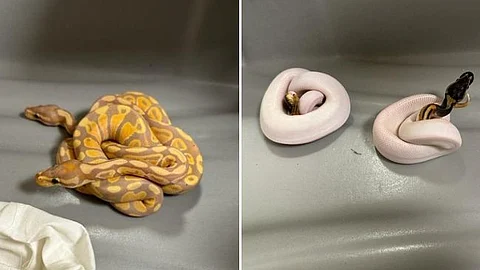

Even as Chennai airport has emerged as a hub for trafficking exotic wildlife species, Indian probe agencies have planned to investigate these cases for possible money laundering and economic offences. The Enforcement Directorate has recommended that the Prevention of Money Laundering Act (PMLA) be invoked in these cases as there is an illegal monetary transaction associated with the trade of exotic pets.
Radhika Venugopalan, Deputy Director of ED, advocated this during a multi-agency coordination meeting held in Chennai to discuss measures for the prevention of illegal trade of exotic pets on December 23, 2022, a document sourced through Right to Information (RTI) Act shows.
During the same meeting, R Tamilchandran, the then IGP (admin) of Tamil Nadu, recommended profiling the accused and their involvement in previous criminal cases for financial investigation by the economic offences wing of the state police.
This indicates that Indian agencies suspect the involvement of organised networks in these cases with links to global money laundering, including hawala channels. This was confirmed by a senior Customs official, who requested anonymity.
This move finds resonance in a 2020 report of the Financial Action Task Force (FATF), a global organisation set up to develop policies to combat money laundering, which highlighted how wildlife traffickers “exploit weaknesses in financial and non-financial sectors to move, hide and launder their proceeds” and that “financial trail of such crimes was rarely investigated.” A source in the ED indicated that no cases have been forwarded to the agency yet, though officials in other agencies said it would be taken up through their Regional Economic Intelligence Council (REIC), where inputs regarding cases common to all agencies are shared.
The Chennai International Airport has reported the maximum number of seizure cases of exotic wildlife species among all Indian airports. A study by Trade Records Analysis of Flora and Fauna in Commerce (TRAFFIC) – a global NGO which specialises in tracking illegal trade in animals – said Chennai airport accounted for 36% of all such seizures among Indian airports from 2011-2020. The seized animals include pythons, iguanas, a leopard, African snakes, marmosets and monkeys, mostly smuggled in from Thailand. In 2023, official records show at least 10 major trafficking attempts have been foiled at Chennai airport. Cases have now been reported in Coimbatore and Tiruchirapalli airports too.
In addition to the demand for exotic pets locally, international airports in Tamil Nadu are preferred due to regular flights from Southeast Asian countries like Thailand, Singapore and Malaysia, according to officials. Another supporting factor is the availability of young men willing to earn quick money by working as couriers to smuggle wildlife in their check-in baggage.
Officials in agencies like Customs and Wildlife Crime Control Bureau (WCCB) which handle these trafficking cases say a money laundering probe is legally sound as charges under India’s Customs Act and Wildlife Protection Act are predicate offences under PMLA.
“Earlier, cases of smuggling of sea cucumber and ivory have been referred to ED for money laundering investigation,” said a senior Indian Forest Service (IFS) official.
There are other ominous signs of Tamil Nadu’s links with the global illegal pet trade. For instance, in February this year, a gang carrying at least eight orangutans escaped through Chennai while travelling from Karnataka. In August, a man from Tamil Nadu was found to have trafficked a baby Kangaroo from Bangkok to Bengaluru. The animal died in transit. In March 2021, a man arrested in Assam with marmosets, tamarins and exotic birds was a resident of Ashok Nagar in Chennai. Investigators have regularly flagged the huge demand for exotic species for showcasing in farms and the presence of ‘petting zoos’ in the state
“A money laundering probe by ED would be able to help restrict this illegal trade. However, this would be effective only if the actual kingpins or purchasers are identified and their assets investigated. If the probe is restricted to the middlemen who source the animals from foreign countries and supply them, it might not be that effective. For this, the Customs and WCCB need to do a more thorough job in investigating the smuggling cases and reach the customer who benefits from this trafficking,” C Rajan, a retired officer of Customs and Directorate of Revenue Intelligence (DRI) said.
A senior Customs officer and a Forest Department official said that a money laundering probe was necessary as the financial value of the exotic species trafficking industry was huge, but flew largely under the radar. The money multiplies exponentially while going up the supply chain, the officials said, citing few key indicators.
For instance, the Customs officer said that a courier smuggling gold from Gulf countries or Southeast Asia was paid only Rs 20,000. “But a courier bringing in ball pythons or marmosets from Thailand is paid Rs 50,000-Rs 1 lakh for a trip. He also is put up in a good hotel and other pleasures are taken care of,” the officer said. Such payoffs are possible because the animals are sold at huge prices in the grey market; for example, marmosets go for Rs 5-10 lakh and iguanas for Rs 1-2 lakh.
The Forest Department official pointed out how the gang smuggling orangutans were able to comfortably afford a bribe of a few lakhs to some personnel of Chennai police and escape. However, the officials felt that a special cell could be formed to investigate the money laundering aspect of wildlife trafficking cases so that dedicated personnel are deputed. This could enable the creation of a common database and close tracking of repeat offenders, possible members of the crime syndicate and modus operandi.
Siddharth Prabhakar is based in Chennai and has covered Greater Chennai Corporation, Railways, DVAC, CBI and other investigative agencies during his six-year stint in Times of India and one-and-a-half years in The New Indian Express.
As Telangana, Mizoram, MP, Chhattisgarh, & Rajasthan go to the polls, TNM and Newslaundry are joining forces to bring you the best on-ground reportage and analysis. Click here to support our election fund.